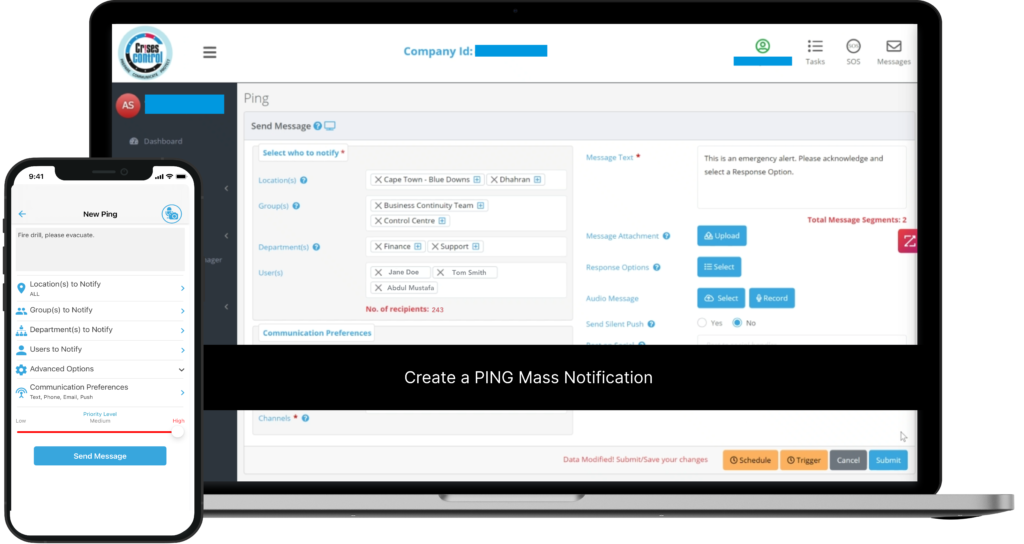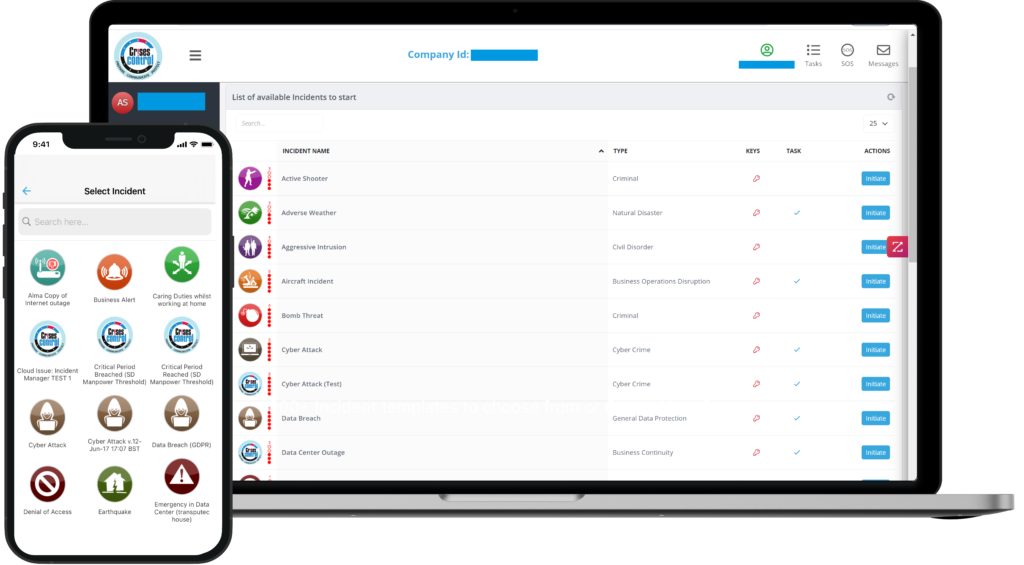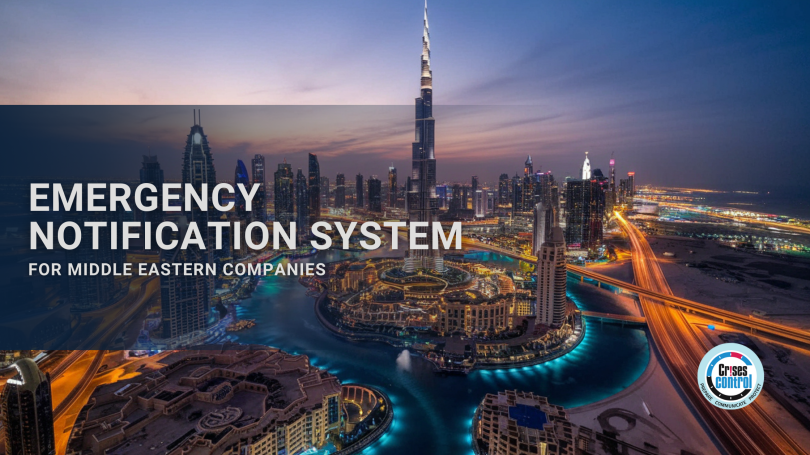Written by Anneri Fourie | Marketing Executive
In the Middle East, industries like oil and gas, aviation, and construction operate under constant pressure. Every day, workers face a unique set of risks, from industrial accidents to natural disasters and geopolitical tensions. Ensuring employee safety isn’t just a priority; it’s a necessity. A vital tool in this endeavour is an effective Emergency Notification System, which provides real-time alerts, enabling organisations to communicate instantly with their workforce and mitigate risks in critical situations.
In this blog, we will explore how emergency notification systems are essential for workplace safety in high-risk industries across the Middle East, along with how Crises Control offers tailored solutions to help businesses stay prepared for emergencies.
Why an Emergency Notification System is Essential for Workplace Safety
In regions like the Middle East, companies encounter unique challenges that put their employees at risk. The rapid growth of high-risk industries, combined with environmental and geopolitical instability, makes having a reliable emergency notification system crucial.
But what exactly is an Emergency Notification System? At its core, it’s more than just a tool for sending out alerts during a crisis. It’s a comprehensive solution designed to safeguard both employees and assets by delivering timely information when it matters most.
Key Functions of an Emergency Notification System
1. Real-Time Alerts: When emergencies strike, every second counts. The ability to communicate instantly with employees can mean the difference between a safe evacuation and a catastrophic incident. An effective Emergency Notification System ensures that alerts are sent immediately, allowing quick decision-making.
2. Multi-Channel Communication: In a world where everyone uses different devices, an emergency notification system must reach employees wherever they are. This means sending alerts via SMS, email, push notifications, and voice calls, ensuring that critical messages get through, no matter the circumstances.
3. Two-Way Communication: Emergencies often require quick feedback from employees. A robust Emergency Notification System allows workers to confirm their safety or request assistance, facilitating better coordination during crises.
These capabilities make emergency notification systems essential for preventing accidents and enhancing overall workplace safety.
High-Risk Industries in the Middle East: A Unique Set of Challenges
Let’s delve deeper into the high-risk industries in the Middle East that stand to gain the most from a reliable emergency notification system. Each sector faces distinct challenges that demand fast and effective communication solutions.
1. Oil and Gas
The oil and gas industry forms the backbone of many Middle Eastern economies, yet it is also fraught with danger. The risks of fires, explosions, and toxic gas leaks are alarmingly high, and the consequences can be devastating.
For instance, in remote drilling locations where communication can be unreliable, alerting workers during a crisis can be challenging. An emergency notification system, such as Crises Control, can bridge this gap by ensuring that workers receive real-time updates, even in isolated areas.
How Crises Control Helps:
- Automated Alerts: The system can send automatic alerts for critical events like fires or equipment failures, allowing for a swift response.
- Real-Time Location Tracking: By monitoring employee locations and enabling check-ins, the system ensures that everyone is safe in hazardous environments.
- Incident Reporting and Analysis: Post-incident analysis tools help organisations learn from each event, improving future response strategies.
2. Aviation
The aviation industry in the Middle East is booming, with major hubs like Dubai and Doha handling millions of passengers each year. However, this growth comes with its own set of risks—security threats, technical malfunctions, and weather-related disruptions can all endanger lives.
In this fast-paced environment, an emergency notification system is crucial for informing airport staff, pilots, and ground crews about any potential dangers. Quick and coordinated responses can save lives and reduce chaos.
How Crises Control Helps:
- Instant Mass Notifications: The system can instantly alert all personnel to security threats or technical issues, enabling rapid action.
- Scenario-Based Planning: Crises Control provides tools for planning how to handle various emergencies, ensuring teams are prepared for anything.
- Post-Incident Reporting: This feature allows aviation companies to review incidents, identify gaps in their emergency procedures, and refine their response strategies over time.
3. Construction
The construction industry is inherently risky, with workers exposed to hazards like equipment malfunctions, accidents, and environmental threats. In such a dynamic environment, an emergency notification system is vital for keeping everyone informed about potential dangers.
In large construction sites, where hundreds of workers may be spread across vast areas, having the ability to notify everyone at once—and confirm their safety—can prevent tragic accidents.
How Crises Control Helps:
- Multi-Channel Communication: This feature ensures that alerts reach workers in remote or dispersed locations, keeping everyone informed.
- Automated Incident Alerts: The system sends immediate notifications when accidents occur, prompting quick action to mitigate injuries.
- SOS Panic Button: This allows workers to request immediate help if they find themselves in danger, ensuring a swift response from safety teams.
Interested in our Ping Emergency Notification System?
Efficiently alert everyone in seconds at scale with our Mass Notification System – PING, get the message out fast and ensure rapid response and recovery.

Real-World Applications of an Emergency Notification System in the Middle East
To understand the practical impact of an emergency notification system, let’s examine a few scenarios where timely notifications could make a significant difference:
1. Fire in an Oil Refinery
Imagine a fire breaking out in a large oil refinery. Employees spread across different areas of the site may not be immediately aware of the danger. An emergency notification system ensures that all workers are alerted in real-time, facilitating swift evacuations and significantly reducing the risk of injury or loss of life.
2. Security Threat at an Airport
In a busy airport, an unforeseen security threat could disrupt operations and put passengers and staff at risk. Using an emergency notification system, airport management can instantly alert all relevant personnel, ensuring security protocols are followed, and the threat is neutralised quickly.
3. Construction Site Accident
On a large construction site, if heavy machinery malfunctions and injures a worker, every second counts. An emergency notification system allows the safety team to be informed immediately, enabling them to deploy medical assistance swiftly and prevent further accidents.
How Crises Control Can Help Your Business in the Middle East
Crises Control offers a comprehensive emergency notification system designed to address the specific challenges faced by industries in the Middle East. With features like real-time alerts, multi-channel communication, and incident management tools, Crises Control helps ensure workplace safety by enabling companies to respond quickly and effectively during emergencies.
Key Features of Crises Control’s Emergency Notification System
- Multi-Channel Notifications: Send alerts via SMS, email, voice calls, and the Crises Control mobile app, ensuring that all employees are informed, even during network outages. This flexibility is critical in the Middle East, where connectivity can be unreliable.
- Real-Time Reporting: Monitor the status of alerts and receive confirmation from employees that they have received and responded to critical messages. This transparency fosters trust and accountability.
- Incident Management: Automate emergency workflows and track the progress of incident responses in real-time. This feature allows companies to evaluate their response effectiveness and make necessary improvements.
- Panic Button Feature: Allow employees to request immediate assistance in life-threatening situations. This simple yet powerful tool can be a lifesaver when every moment counts.
With Crises Control, your business can maintain constant communication with its workforce, even during the most challenging times, ensuring the safety and security of employees.

Interested in our Incident Management Software?
Customise your Critical Event Management Software to meet your specific needs with our flexible tools & stay connected and informed during the crisis and incident management process
Conclusion: Protect Your Workplace with a Reliable Emergency Notification System
In today’s unpredictable environment, ensuring workplace safety is non-negotiable for companies across the Middle East. Whether you operate in the high-risk oil and gas sector, the bustling aviation industry, or the hazardous construction industry, a robust Emergency Notification System can be the difference between a safe evacuation and a disaster.
Crises Control offers a tailor-made solution for businesses in the Middle East, ensuring real-time alerts, seamless communication, and efficient incident management. Don’t leave your workplace safety to chance—invest in a reliable notification system today.
Ready to see how Crises Control can protect your business? Contact us today to get a free personalised demo.
Request a FREE Demo

